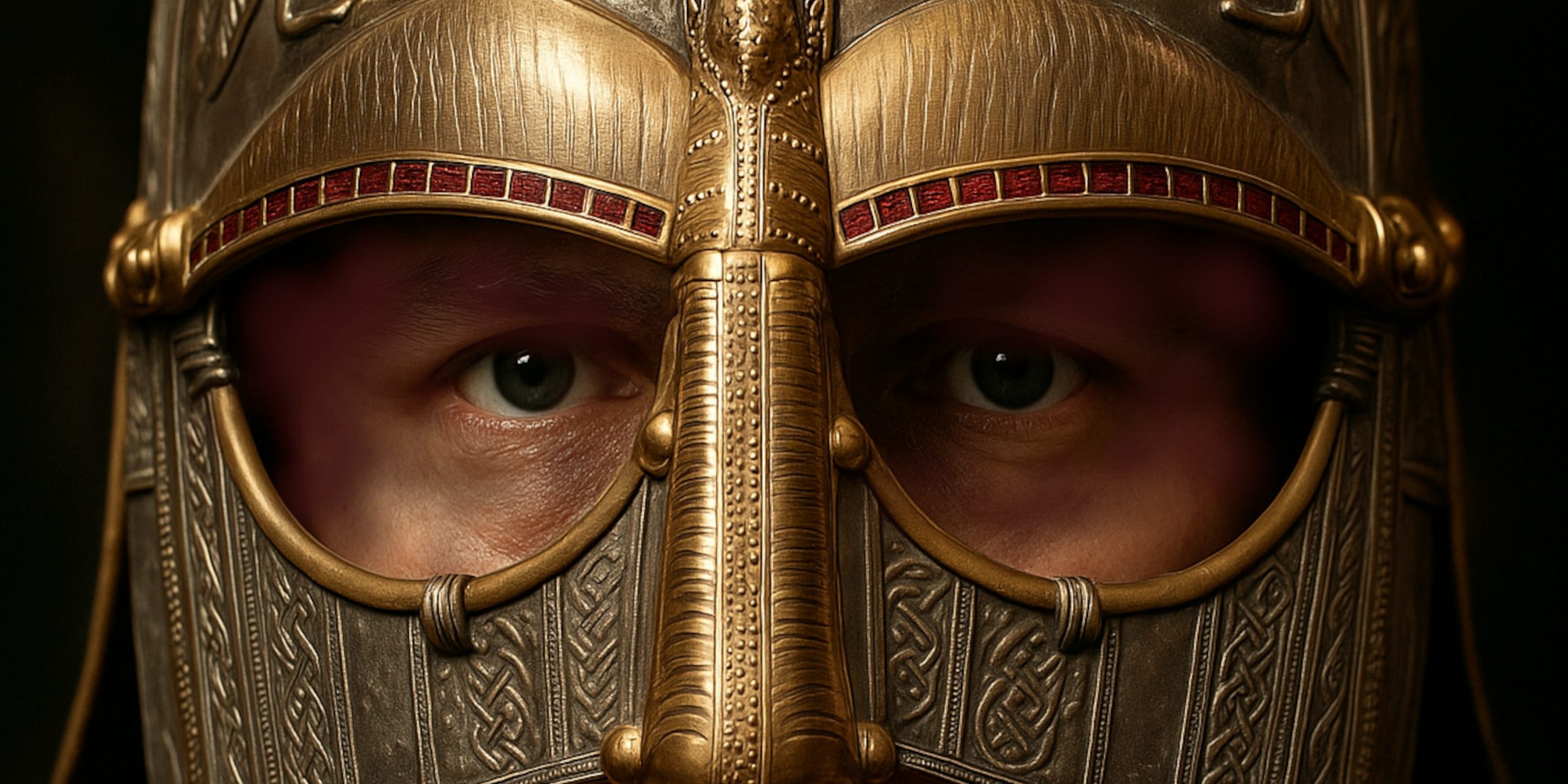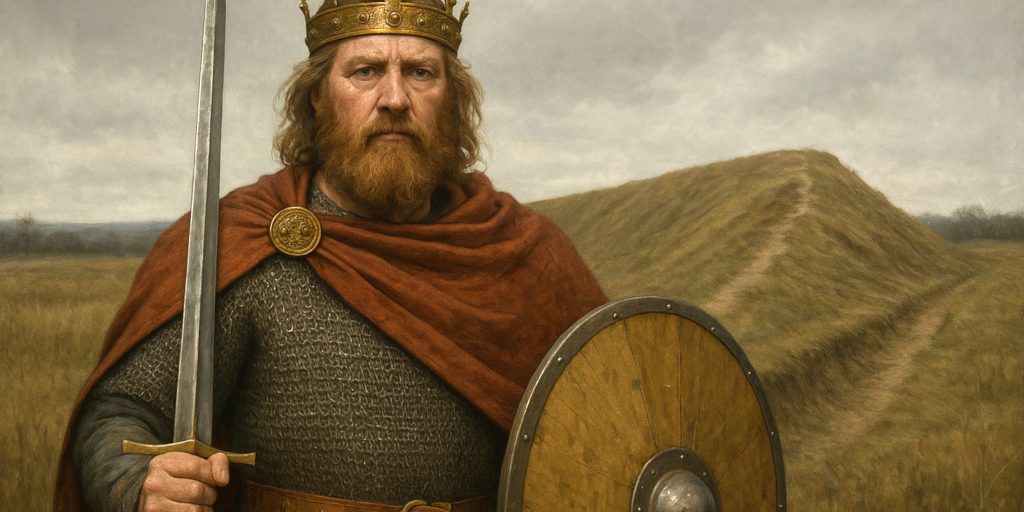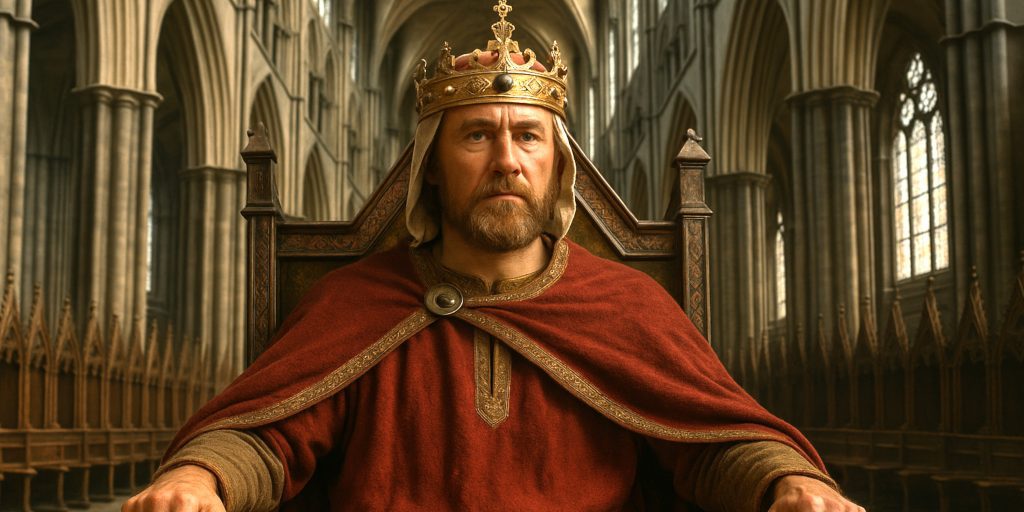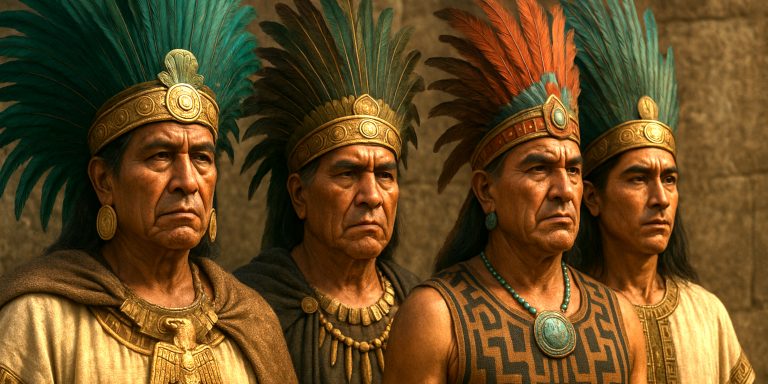
Before England became a single kingdom, it was a shifting network of rival realms and bloodlines. Kings rose by sword, saints by sacrifice, and queens by diplomacy or sheer will. From Bertha of Kent’s quiet conversion to Emma of Normandy’s cunning politics, the Anglo-Saxon royals forged the identity of early England, one border, battle, and baptism at a time.
What follows is the most complete and balanced record of the Anglo-Saxon kings and queens, including the often-forgotten East Anglian line, presented in order with insight, context, and just enough cynicism to keep it honest.
The Early Anglo-Saxon Kingdoms (The Heptarchy)
Kent
- King Hengest (Hengest) – c. 449–488
Legendary Jutish founder of Kent. Likely half myth, half muscle.
Queen: Unknown. - King Aethelbert (Æthelberht) – 560–616
First Christian king in England, ruled from Canterbury.
Queen Bertha (Beorhthe) – A Frankish princess whose faith quietly changed a nation.
Northumbria
- King Edwin (Eadwine) – 616–633
United Deira and Bernicia; converted to Christianity.
Queen Aethelburg (Æthelburh) – Daughter of Aethelbert, later abbess at Lyminge. - King Oswald (Osuald) – 634–642
Warrior-saint who united Northumbria.
Queen Cyneburh (Cyneburga) – Possibly of Bernician nobility. - King Oswiu (Oswiu) – 642–670
Defeated pagan Mercia at Winwaed.
Queen Eanflad (Eanflæd) – Later abbess of Whitby, blending dynasty and devotion.
Mercia

- King Penda (Penda) – 626–655
The last great pagan king of England.
Queen Cynewise (Cynewis) – Likely an influential court figure. - King Offa (Offa) – 757–796
Built Offa’s Dyke and ruled most of England.
Queen Cynethryth (Cyneðryð) – The only Anglo-Saxon queen to have coins bearing her image.
Wessex
- King Cerdic (Cerdic) – 519–534
Semi-legendary founder of Wessex.
Queen: Unknown. - King Ine (Ine) – 688–726
Wrote one of England’s first law codes.
Queen Aethelburg (Æthelburg) – Famously burned Taunton to suppress rebellion.
East Anglia

- King Wuffa (Wuffa) – c. 550–578
Founder of the Wuffingas dynasty, which ruled East Anglia for centuries. - King Tytila (Tytila) – c. 578–593
Son of Wuffa; strengthened the early kingdom. - King Raedwald (Rædwald) – c. 593–624
Likely the Sutton Hoo king. Converted to Christianity but kept a pagan altar “for balance.” Recognised as Bretwalda of the south. - King Eorpwald (Eorpwald) – c. 624–627
Converted to Christianity; assassinated by a pagan noble. - King Ricberht (Ricberht) – c. 627–630
Brief pagan restoration after Eorpwald’s death. - King Sigeberht (Sigeberht) – c. 630–635
Educated in Gaul; abdicated to become a monk and refused to fight, dying unarmed in battle. - King Ecgric (Ecgric) – c. 630–635
Possibly co-ruler with Sigeberht; killed by Mercians. - King Anna (Anna) – c. 635–654
Pious ruler; his daughters became saints, including Aethelthryth (Æthelthryth) of Ely. - King Aethelhere (Æthelhere) – 654–655
Killed alongside Penda at the Battle of Winwaed. - King Aethelwald (Æthelwold) – 655–663
Maintained peace with Mercia after heavy losses. - King Ealdwulf (Ealdwulf) – 663–713
Restored stability; ruled for fifty years, overseeing trade and prosperity. - King Aelfwald (Ælfwald) – 713–749
Patron of learning and religion. - Kings Beonna and Aethelberht I (Beonna / Æthelberht) – c. 749–760
Possibly co-rulers; short period of division. - Kings Aethelred and Aethelberht II (Æthelred / Æthelberht) – c. 760–794
Aethelberht II was executed by Offa of Mercia, allegedly for political convenience. - King Aethelstan (Æthelstan) – late 8th century
Possibly installed by Mercia during its supremacy. - King Eadwald (Eadwald) – 796–798
Briefly reasserted independence after Offa’s death. - King Aethelstan II (Æthelstan) – early 9th century
Little recorded; probably a Mercian subordinate. - King Aethelweard (Æthelweard) – c. 845–855
Faced increasing Viking incursions. - King Edmund the Martyr (Eadmund) – c. 855–869
Captured and executed by the Great Heathen Army; became St Edmund, England’s first royal saint.
The Rise of Wessex and the Path to Unity (802–899)
- King Egbert (Ecgbriht) – 802–839
Extended Wessex rule across southern England.
Queen Redburga (Hrædbyrg) – Possibly related to Charlemagne. - King Aethelwulf (Æthelwulf) – 839–858
Pious pilgrim to Rome.
Queen Osburh (Osburga) – Mother of Alfred the Great.
Later Wife: Judith of Flanders (Iudit) – Carolingian princess, controversial marriage. - King Aethelred I (Æthelred I) – 865–871
Died fighting Vikings.
Queen Wulfthryth (Wulfrȳð) – Little known but likely of noble standing. - King Alfred the Great (Ælfred) – 871–899
Defender of Wessex; educator and reformer.
Queen Ealhswith (Ealhswið) – Founded religious houses and preserved Alfred’s legacy.
Aethelflaed, Lady of the Mercians (Æthelflæd) – 911–918
Ruler of Mercia in her own right. Daughter of Alfred, wife of Aethelred of Mercia. She built fortresses, led armies, and reclaimed towns from the Vikings, ruling as Myrcna hlæfdige (“Lady of the Mercians”).
note from author: If England had allowed female monarchs before 1066, Aethelflaed would have been the first crowned, and probably the last to tolerate opposition.
The House of Alfred (899–975)

- King Edward the Elder (Eadweard se Ieldra) – 899–924
Consolidated Wessex and Mercia.
Queens: Ecgwinna, Aelfflaed, Eadgifu of Kent. - King Aethelstan (Æthelstan) – 924–939
First ruler of all England; never married. - King Edmund I (Eadmund) – 939–946
Murdered at a feast; remembered for restoring order.
Queen Aelfgifu (Ælfgifu) – Canonised for charity. - King Eadred (Eadred) – 946–955
Unified Northumbria; unmarried and devout. - King Eadwig (Eadwig) – 955–959
Romantic scandal overshadowed his reign.
Queen Aelfgifu (Ælfgifu) – Marriage annulled by the church. - King Edgar the Peaceful (Eadgar) – 959–975
Presided over England’s golden age.
Queens: Aethelflaed the Fair, Aelfthryth.
The Decline and Danish Conquest (975–1042)

- King Edward the Martyr (Eadweard se Halga) – 975–978
Murdered at Corfe Castle; unmarried. - King Aethelred II “the Unready” (Æthelred Unræd) – 978–1016
Paid off Viking raiders repeatedly.
Queens: Aelfgifu of York, Emma of Normandy. - King Edmund II “Ironside” (Eadmund Isenhearde) – 1016
Heroic defender against Cnut; died after peace treaty.
Queen Ealdgyth (Ealdgyð) – Mother of his heirs.
The Danish Kings

- King Sweyn Forkbeard (Svein Forkbeard) – 1013–1014
Briefly conquered England; father of Cnut.
Queen Swietoslawa (Świętosława / Gunhild) – A Polish princess. - King Cnut the Great (Cnut se Micela) – 1016–1035
Ruler of England, Denmark, Norway.
Queens: Aelfgifu of Northampton, Emma of Normandy. - King Harold I “Harefoot” (Hereweald Harefoot) – 1035–1040
Short, contested reign; unmarried. - King Harthacnut (Hardecnute) – 1040–1042
Reunited England and Denmark; died mid-toast.
The Last Anglo-Saxon Monarchs (1042–1066)

- King Edward the Confessor (Eadweard se Andgietfulla) – 1042–1066
Saintly, cautious, and indecisive.
Queen Edith of Wessex (Eadgyth) – Educated, politically shrewd, and long-lived. - King Harold Godwinson (Hereweald Godwinson) – 1066
Last Anglo-Saxon king; fell at Hastings.
Queen Edith of Mercia (Ealdgyth) – Marriage united north and south on the eve of conquest.
Chronological Timeline of Anglo-Saxon Kings and Queens (Including East Anglia)
| Ruler | Kingdom | Reign (Approx.) | Consort / Queen | Notes |
|---|---|---|---|---|
| Hengest (Hengest) | Kent | c. 449–488 | Unknown | Legendary Jutish founder of Kent. May be partly mythological. |
| Aethelbert (Æthelberht) | Kent | 560–616 | Bertha (Beorhthe) | First Christian king; issued earliest English law code. |
| Edwin (Eadwine) | Northumbria | 616–633 | Aethelburg (Æthelburh) | Converted to Christianity; killed at Hatfield Chase. |
| Oswald (Osuald) | Northumbria | 634–642 | Cyneburh (Cyneburga) | Warrior-saint; united Northumbria under Christianity. |
| Oswiu (Oswiu) | Northumbria | 642–670 | Eanflad (Eanflæd) | Defeated Mercia; consolidated Christianity. |
| Penda (Penda) | Mercia | 626–655 | Cynewise (Cynewis) | Last great pagan king of England. |
| Offa (Offa) | Mercia | 757–796 | Cynethryth (Cyneðryð) | Built Offa’s Dyke; wife had coins struck in her image. |
| Cerdic (Cerdic) | Wessex | 519–534 | Unknown | Legendary founder of Wessex. |
| Ine (Ine) | Wessex | 688–726 | Aethelburg (Æthelburg) | Lawgiver; queen famously burned Taunton to suppress rebels. |
| Wuffa (Wuffa) | East Anglia | c. 550–578 | Unknown | Founder of the Wuffingas dynasty. |
| Tytila (Tytila) | East Anglia | c. 578–593 | Unknown | Father of Raedwald; early ruler of the Anglian kingdom. |
| Raedwald (Rædwald) | East Anglia | c. 593–624 | Unknown | Bretwalda; likely the Sutton Hoo king; balanced paganism and Christianity. |
| Eorpwald (Eorpwald) | East Anglia | c. 624–627 | Unknown | Converted to Christianity; assassinated by a pagan noble. |
| Ricberht (Ricberht) | East Anglia | c. 627–630 | Unknown | Brief pagan reaction after Eorpwald’s death. |
| Sigeberht (Sigeberht) | East Anglia | c. 630–635 | Unknown | Abdicated to become a monk; died unarmed in battle. |
| Ecgric (Ecgric) | East Anglia | c. 630–635 | Unknown | Co-ruled with Sigeberht; killed fighting Mercians. |
| Anna (Anna) | East Anglia | c. 635–654 | Unknown | Pious ruler; father of several saints including Aethelthryth of Ely. |
| Aethelhere (Æthelhere) | East Anglia | 654–655 | Unknown | Killed at Winwaed alongside Penda. |
| Aethelwald (Æthelwold) | East Anglia | 655–663 | Unknown | Restored peace with Mercia. |
| Ealdwulf (Ealdwulf) | East Anglia | 663–713 | Unknown | Ruled fifty years; prosperous and stable reign. |
| Aelfwald (Ælfwald) | East Anglia | 713–749 | Unknown | Patron of learning and religion. |
| Beonna / Aethelberht I (Beonna / Æthelberht) | East Anglia | c. 749–760 | Unknown | Possibly co-rulers; brief division in East Anglia. |
| Aethelred / Aethelberht II (Æthelred / Æthelberht) | East Anglia | c. 760–794 | Unknown | Aethelberht executed by Offa; regarded as a martyr. |
| Aethelstan (Æthelstan) | East Anglia | late 8th century | Unknown | Possibly a Mercian appointee under Offa’s supremacy. |
| Eadwald (Eadwald) | East Anglia | 796–798 | Unknown | Brief independent reign after Offa’s death. |
| Aethelweard (Æthelweard) | East Anglia | c. 845–855 | Unknown | Faced Viking raids. |
| Edmund the Martyr (Eadmund) | East Anglia | c. 855–869 | None | Captured and executed by Vikings; became Saint Edmund. |
| Egbert (Ecgbriht) | Wessex | 802–839 | Redburga (Hrædbyrg) | Extended Wessex control; ancestor of Alfred the Great. |
| Aethelwulf (Æthelwulf) | Wessex | 839–858 | Osburh (Osburga); later Judith of Flanders (Iudit) | Pious; travelled to Rome; father of Alfred. |
| Aethelred I (Æthelred I) | Wessex | 865–871 | Wulfthryth (Wulfrȳð) | Died fighting the Great Heathen Army. |
| Alfred the Great (Ælfred) | Wessex | 871–899 | Ealhswith (Ealhswið) | Defended England from Vikings; promoted education and law. |
| Aethelred of Mercia (Æthelred) | Mercia | 883–911 | Aethelflaed (Æthelflæd) | Ruler under Wessex; fought alongside Alfred’s forces. |
| Aethelflaed, Lady of the Mercians (Æthelflæd) | Mercia | 911–918 | Aethelred (Æthelred) | Daughter of Alfred; ruled independently; retook towns from Vikings. |
| Edward the Elder (Eadweard se Ieldra) | Wessex | 899–924 | Ecgwinna (Ecgwine), Aelfflaed (Ælfflæd), Eadgifu (Eadgifu) | Expanded and unified southern England. |
| Aethelstan (Æthelstan) | England | 924–939 | Unmarried | First true King of England; victor at Brunanburh. |
| Edmund I (Eadmund) | England | 939–946 | Aelfgifu (Ælfgifu) | Reunified north; murdered at a feast. |
| Eadred (Eadred) | England | 946–955 | Unmarried | Brought Northumbria under firm control. |
| Eadwig (Eadwig) | England | 955–959 | Aelfgifu (Ælfgifu) | Marriage annulled; known for romantic scandal. |
| Edgar the Peaceful (Eadgar) | England | 959–975 | Aethelflaed the Fair (Æthelflæd), Aelfthryth (Ælfþryð) | Presided over England’s golden age of peace. |
| Edward the Martyr (Eadweard se Halga) | England | 975–978 | Unmarried | Murdered at Corfe Castle; later sainted. |
| Aethelred II “the Unready” (Æthelred Unræd) | England | 978–1016 | Aelfgifu of York (Ælfgifu), Emma of Normandy (Ælfgifu Emma) | Reign dominated by Viking invasions and Danegeld payments. |
| Edmund II “Ironside” (Eadmund Isenhearde) | England | 1016 | Ealdgyth (Ealdgyð) | Fought Cnut to a draw before dying unexpectedly. |
| Sweyn Forkbeard (Svein Forkbeard) | Denmark / England | 1013–1014 | Swietoslawa (Świętosława / Gunhild) | Brief conqueror of England; father of Cnut. |
| Cnut the Great (Cnut se Micela) | England / Denmark / Norway | 1016–1035 | Aelfgifu of Northampton (Ælfgifu), Emma of Normandy (Ælfgifu Emma) | Ruled vast North Sea Empire; model of effective kingship. |
| Harold I “Harefoot” (Hereweald Harefoot) | England | 1035–1040 | None | Short, contested rule after Cnut’s death. |
| Harthacnut (Hardecnute) | England / Denmark | 1040–1042 | Unmarried | Died suddenly at a wedding feast. |
| Edward the Confessor (Eadweard se Andgietfulla) | England | 1042–1066 | Edith of Wessex (Eadgyth) | Pious and cautious; his death led to the Norman invasion. |
| Harold Godwinson (Hereweald Godwinson) | England | 1066 | Edith of Mercia (Ealdgyth) | Last Anglo-Saxon king; fell at the Battle of Hastings. |
Reading Notes
- Kingdoms are specified until England’s unification under Aethelstan (924).
- Old English spellings are included in brackets for accuracy and linguistic context.
- Female rulers (like Aethelflaed) are listed with full authority titles.
- Religious and political status noted where relevant (e.g., saints, Bretwalda, overlords).
Summary of Major Turning Points
| Era | Event | Outcome |
|---|---|---|
| c. 600–800 | Rise of the Heptarchy | Seven rival kingdoms define early England. |
| c. 800–900 | Viking Invasions | Consolidation of power under Wessex. |
| 899–939 | Alfred’s Successors | England unified under Aethelstan. |
| 978–1016 | Danish Wars | Weakening of native rule under Aethelred. |
| 1016–1035 | Cnut’s Empire | England becomes part of a North Sea realm. |
| 1042–1066 | Restoration and Fall | Edward’s saintly rule ends in Norman conquest. |
Quick Reference: The Most Influential Anglo-Saxon Monarchs
| Ruler | Contribution |
|---|---|
| Aethelbert of Kent | Introduced Christianity and the first English law code. |
| Offa of Mercia | Expanded Mercian power and standardised coinage. |
| Alfred the Great | Defended England against Viking invasion; laid foundations for English unity. |
| Aethelflaed of Mercia | Fortified the Midlands and advanced England’s unification. |
| Aethelstan | First king of all England; key in European diplomacy. |
| Cnut the Great | Unified Scandinavia and England; model of pragmatic kingship. |
| Edward the Confessor | His death triggered the Norman Conquest, closing the Anglo-Saxon era. |
Legacy
The Anglo-Saxon kings and queens were builders of England long before the Normans arrived. Their reigns created the first English laws, towns, and culture. The transition from pagan warlords to Christian monarchs mirrored the country’s transformation from tribes to kingdom.
And among the men who ruled by sword, women like Bertha, Cynethryth, Aethelflaed, and Emma of Normandy proved that power could just as easily wear a veil as a crown.



